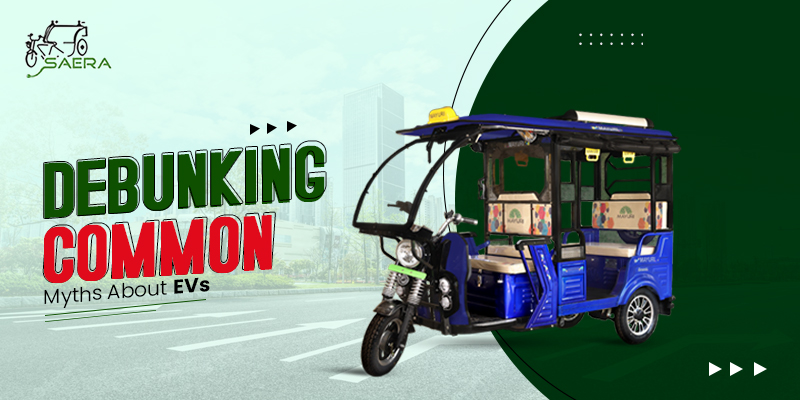Electric vehicles are becoming necessary and significant every day. More and more individuals are considering electric vehicles as a feasible choice as pollution levels rise and air quality degrades. Also, because they don’t require gasoline and emit zero emissions or noise, electric vehicles, or EVs, are a shining example of sustainable personal transportation. People often ponder whether EVs require insurance for cars or bikes due to their diverse features. Well, EVs also go on roads and are subject to their perils. As a result, they are required by law to get automobile insurance.
Therefore, it’s okay if you have questions regarding electric vehicles or EVs, as they are India’s more popular battery-operated cargo three-wheelers. Also, let’s look at the most widespread misconception you hear about EVs and bust these myths individually.
Myth #1: Charging an electric vehicle is time-consuming
The initial generation of EVs was inconvenient for the typical user because charging them required a long time. But nowadays, these EVs have advanced, just like other technologies. The reality is that most modern EVs charge much faster than conventional ones. Depending on the charging station and other factors, a powerful battery electric car can be fully charged in under one hour.
Myth #2: EVs are Slower as compared to conventional Vehicles
EVs accelerate faster than gas-powered cars and truly have more than enough speed for everyday use. This is because battery-operated vehicles are much easier than conventional engines. Also, certain electric vehicles can produce 100% of their torque instantly, resulting in quicker 0-60 mph times.
Myth #3: Electric vehicles are not affordable
It is believed that electric vehicles (EVs) are out of reach for most consumers; nevertheless, the market trend is changing. EVs are more widely available and reasonably priced on Indian roads as a result of the numerous government incentives and subsidies. EVs are cost-effective for both individual drivers and businesses who make the switch, thanks to cheaper operating costs, major tax relaxations, hassle-free maintenance, and repairs. As with any vehicle, leasing can significantly reduce the high upfront expenses of EVs.
Suggested Read: What are the Advantages of Electric Three-Wheelers?
Myth #4: EVs are not suitable for long-distance travel
EV technology has advanced to the point that you can easily get a range of over 300 km nowadays. One full charge provides a 340 km range for electric SUVs like the MG ZS EV. Lithium-ion batteries have fundamentally altered the EV market. Compared to lead-acid batteries, these batteries offer a far longer lifespan and a higher energy density. The top five electric vehicles on the Indian market have an average range of 300 km, which is more than enough for daily use.
Myth #5: Electric cars are not as environmentally benign as they appear
The truth: Even when you account for the carbon footprint of electric charging, an electric vehicle will produce 3 times less carbon dioxide emissions than other vehicles. EVs are also better at turning electrical energy to wheel power than conventional fuel-powered vehicles. As more unconventional energy sources become the norm, the carbon footprint created by producing the electricity used to charge EVs can be decreased.
If you’re considering buying an electric vehicle, consider visiting Saera Electric Auto Pvt Ltd. We are one of the top E loader manufacturers in India, known for producing cleaner and greener electric vehicles. We have wide-ranging business interests ranging from Automobile spare parts, agriculture equipment and Electric vehicles.

